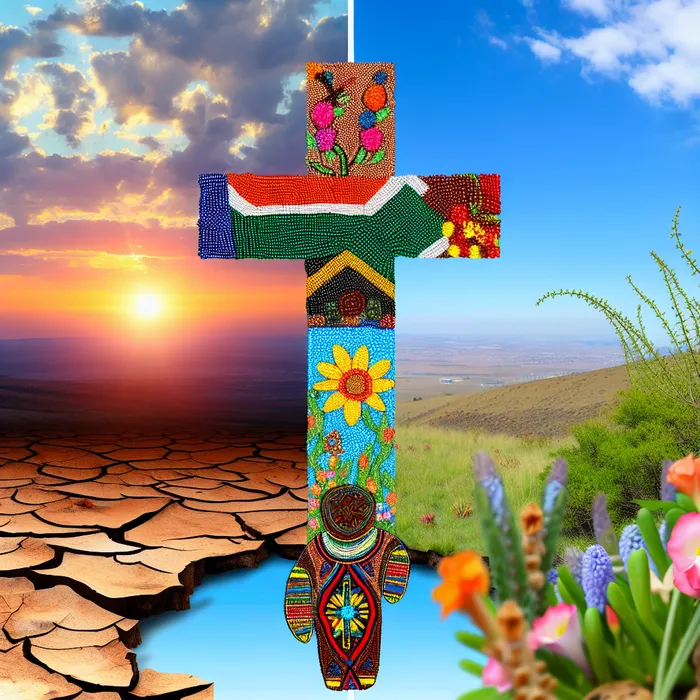
Easter reminds us that celebration follows tragedy and sunshine dispels shadows.
Image: Ron AI
IN my quest to enrich my mind, I discovered Broken for You by Stephanie Kallos. The story is set in Seattle, America, in a 15 000-square-foot mansion inhabited by Margaret Hughes, a 75-year-old woman who has lived there mostly alone.
Hughes decides to rent a room, and Wanda, a woman from New York with her own struggles, responds to an advertisement.
The house is filled with priceless porcelain figurines — thousands of them. Hughes spends her days dusting them, bound to them by history because her father collected them when she was a child. Later, she learned they had been stolen. Unable to return most of them or profit from their sale, she lives isolated, burdened by inherited guilt.
Wanda brings her crises, and together, they decide to shatter the porcelain figurines. From the broken shards, they create mosaics: images of Jewish families, menorahs, and other artworks displayed publicly, with full disclosure of their origins. This act of reconstructing shattered pieces symbolises resurrection and reframing the past — a metaphor for the Easter journey.
In 1 Peter 3:15, Christians are exhorted to “always be ready to give an account for the hope within you”. Giving an account of hope is challenging, especially in times of tragedy. Doubt and fear are not signs of weak faith but natural responses. Yet, many equate hope with certainty. In moments of loss, pastors must proclaim Christian hope.
Many face shadows in life — guilt, grief, disappointment, temptation, and fear. When we encounter walls in our careers, personal lives, or relationships, it’s easy to feel hopeless about our lack of resources, companionship, or support. We stand amidst broken pieces, convinced nothing good can come of this.
Yet, even in fragility, God is present. Easter reminds us that celebration follows tragedy and sunshine dispels shadows. Finding sunshine in shadowy places means discovering hope and light in darkness. It affirms that God’s comfort is ever-present.
We live in a culture of fear, perpetuated by the media. However, nothing can separate us from God’s love — not death, life, angels, or demons. Because of this, we can live courageously despite uncertainty. All we need is to re-establish our conversation with God.
Our nation faces daunting challenges. We can choose to emotionally and spiritually disintegrate or grow stronger through struggle, rebuilding on trust in God.
This Easter, may we feel God’s loving arms and know He will never forsake us. Despite rising costs and unemployment, there is hope for the present and future because of God’s promises.
Hope is not optimism. Vaclav Havel said: “Hope is not the conviction that something will turn out well but the certainty that something makes sense, regardless of how it turns out.” True hope comes from elsewhere, urging us to persevere and seek understanding even in despair.
We have banished God from daily conversations, as Richard John Neuhaus noted. It’s time to bring Him back to the centre of our lives.
In Michelle Baker-Wright’s essay, Hope in the Midst of the Pieces, she posits that our inadequacies offer opportunities to witness God’s faithfulness. When we face walls, we often feel hopeless. But Jesus’s resurrection challenges us in these moments. The disciples invited Jesus to stay despite their failures, and He reminded them of His faithfulness.
Jesus restores and helps us sort through broken pieces because that is who He is. His resurrection embodies God’s faithfulness, overcoming barriers creatively. Where in our lives do we need to invite Jesus to stay? Where do we feel like broken shards that make no sense? As we name these places, we can hold them before Jesus, trusting He will mend them into a new image reflecting His presence.
This is my message of hope amid despair. This Easter, as we reflect at home, dare to believe hope is on the horizon. Allow Jesus to reframe the broken pieces. I speak of hope in the midst of brokenness.
* Dr Vusi Shongwe works in the Department of Arts and Culture in KwaZulu-Natal and writes in his personal capacity.
** The views expressed here do not reflect those of the Sunday Independent, Independent Media or IOL.
Related Topics: